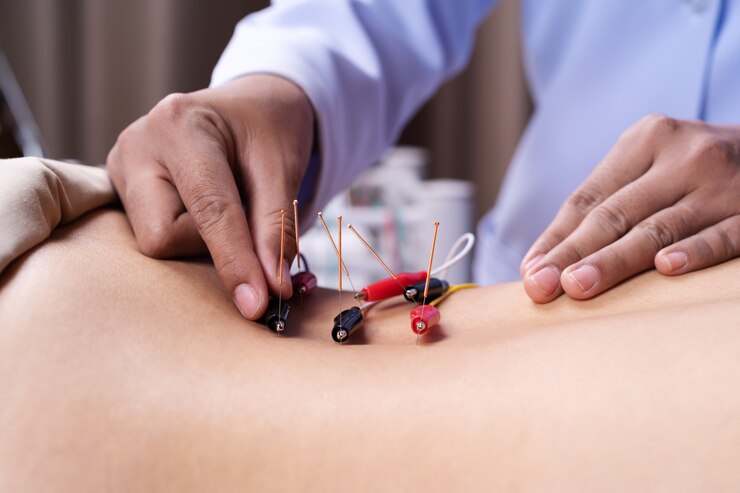Health
Unveiling the Truth Behind Acupuncture: A Comprehensive Guide

Are you curious about the ancient practice of acupuncture? Wondering what it’s all about and how it could potentially benefit your health? Look no further! In this comprehensive guide, we’ll dive deep into the world of acupuncture, uncovering its origins, demystifying its science, and exploring its many potential benefits. Whether you’re seeking pain relief, improved mental well-being, or enhanced fertility, acupuncture just might be the answer you’ve been searching for. So sit back, relax, and prepare to unravel the truth behind this fascinating alternative therapy. Let’s get started!
What is Acupuncture?
Acupuncture is a traditional Chinese healing practice that involves the insertion of thin needles into specific points on the body. These points, known as acupuncture points or acupoints, are believed to be connected to energy pathways called meridians. By stimulating these acupoints, acupuncture aims to restore balance and improve the flow of energy throughout the body.
This ancient therapy is based on the concept of Qi (pronounced “chee”), which refers to vital life force energy. According to traditional Chinese medicine, when Qi becomes blocked or imbalanced, it can lead to various health issues. Acupuncture works by restoring harmony and promoting self-healing within the body. Rather than focusing solely on symptoms, acupuncture addresses underlying imbalances and seeks to treat the root cause of ailments.
The History and Origins of Acupuncture
Acupuncture, a practice rooted in ancient Chinese medicine, has a rich history and origins that date back thousands of years. Its beginnings can be traced to the belief in Qi (pronounced “chee”), the vital energy that flows through our bodies along specific pathways called meridians.
Legend has it that acupuncture was discovered by accident when warriors wounded in battle noticed relief from pain and other ailments after being struck by arrows in specific areas of their body. This observation led to the development of acupuncture as a healing technique using thin needles inserted into precise points on the body to stimulate these meridians and restore balance within the body’s energy system. Today, acupuncture continues to evolve and gain recognition worldwide for its effectiveness in treating various conditions.
How Does Acupuncture Work?
Acupuncture is an ancient Chinese practice that has been used for centuries to promote healing and balance in the body. But how does it actually work? Well, according to traditional Chinese medicine, acupuncture works by stimulating specific points on the body known as acupoints. These acupoints are believed to be connected by pathways or meridians through which vital energy, or Qi (pronounced “chee”), flows.
By inserting thin needles into these acupoints, an acupuncturist can help restore the flow of Qi and bring the body back into harmony. It is thought that acupuncture helps regulate various bodily functions such as blood circulation, hormone levels, and immune response. Additionally, recent research suggests that acupuncture may also stimulate the release of endorphins – natural pain-relieving chemicals in the brain – helping to alleviate pain and promote a sense of well-being.
In short, acupuncture aims to rebalance the body’s energy flow and stimulate its natural healing abilities. While there is ongoing scientific debate about exactly how acupuncture works from a Western perspective, many people swear by its effectiveness in addressing a wide range of health concerns. Whether you believe in its mechanisms or not, there’s no denying that countless individuals have found relief through this ancient practice.
The Science Behind Acupuncture
Acupuncture may seem like a mystical practice, but there is actually scientific evidence to support its effectiveness. The science behind acupuncture lies in the concept of qi (pronounced “chee”), which refers to the flow of energy within the body. According to traditional Chinese medicine, when this energy becomes imbalanced or blocked, it can lead to pain and illness.
During an acupuncture session, thin needles are inserted into specific points along meridians in the body. These points correspond to different organs or systems, and by stimulating these points, acupuncture aims to restore balance and promote healing. Research has shown that acupuncture can have various physiological effects on the body, such as releasing endorphins (natural painkillers), reducing inflammation, improving blood circulation, and regulating neurotransmitters.
The scientific community has conducted numerous studies on acupuncture’s efficacy for a range of conditions including chronic pain management, anxiety and depression relief, digestive issues improvement and sleep disorders treatment. While more research is still needed in some areas of study regarding this ancient practice’s mechanisms of action , findings so far suggest that acupuncture holds promise as a complementary therapy for many health conditions
Common Misconceptions about Acupuncture
Acupuncture, with its ancient roots and mystical reputation, is often surrounded by misconceptions. One common misconception is that acupuncture only involves sticking needles into the body randomly. However, in reality, acupuncture follows a systematic approach based on meridians and specific points along them.
Another misconception is that acupuncture is extremely painful. While it’s true that you may feel some sensations during treatment, such as tingling or warmth, most people find the experience quite comfortable and relaxing. It’s important to remember that the needles used in acupuncture are very thin and designed to minimize discomfort.
The truth behind these misconceptions lies in understanding the principles of acupuncture and how it works holistically to promote healing and balance within the body. By debunking these myths, we can better appreciate the effectiveness of this time-honored practice in treating various conditions.
Conditions Treated with Acupuncture
From chronic pain to anxiety, acupuncture has been used for centuries to address a wide range of health conditions. One area where acupuncture shines is in pain management. Whether it’s back pain, migraines, or arthritis, many people find relief through regular acupuncture sessions.
In addition to pain relief, acupuncture has also been shown to be effective in treating mental health issues such as anxiety and depression. By targeting specific points on the body, acupuncture can help regulate neurotransmitters and promote a sense of calm and well-being. This holistic approach can complement traditional therapy methods and provide much-needed support for those struggling with their mental health.
Pain Management
Pain management is one of the most common reasons people turn to acupuncture. Whether it’s chronic pain from conditions like arthritis or acute pain from injuries, acupuncture has been shown to provide relief. Through the insertion of thin needles into specific points on the body, acupuncture helps stimulate the release of endorphins – natural painkillers produced by our bodies.
These endorphins help reduce pain and promote a sense of well-being. Additionally, acupuncture can also improve blood circulation and relax tense muscles, further alleviating discomfort. Many individuals find that regular acupuncture sessions not only help manage their pain but also minimize reliance on medication and other invasive treatments. So if you’re seeking a natural approach to managing your pain, consider giving acupuncture a try!
Anxiety and Depression
Living with anxiety and depression can be incredibly challenging. These mental health conditions can affect every aspect of your life, making it difficult to function and enjoy daily activities. However, acupuncture has shown promise in alleviating symptoms associated with anxiety and depression.
Acupuncture works by stimulating specific points on the body to restore balance and improve energy flow. This ancient practice has been used for centuries as a natural approach to mental health issues. Many people find that acupuncture helps reduce feelings of stress, anxiety, and sadness, promoting an overall sense of well-being. If you’re struggling with these conditions, considering adding acupuncture to your treatment plan may provide much-needed relief.
Digestive Issues
Digestive issues can be a real pain in the gut. From bloating to indigestion, these problems can disrupt our daily lives and leave us feeling uncomfortable. Thankfully, acupuncture may offer some relief.
By targeting specific points on the body, acupuncture aims to restore balance and harmony within the digestive system. It has been known to alleviate symptoms such as nausea, acid reflux, and irritable bowel syndrome (IBS). So if you’re tired of dealing with tummy troubles, it might be worth giving acupuncture a try!
Insomnia
Insomnia, the relentless sleep thief that haunts countless nights. The struggle to fall asleep or stay asleep can be overwhelming and exhausting. Tossing and turning in bed, watching the minutes tick by on the clock, it’s a frustrating battle that leaves you drained both physically and mentally.
But fear not! Acupuncture may hold the key to unlocking peaceful slumber once again. By targeting specific points on your body, acupuncture aims to rebalance your energy flow and promote relaxation. This ancient practice has shown promising results in improving sleep quality and duration for those plagued by insomnia.
So how does acupuncture work its magic? Well, thin needles are strategically inserted into specific acupoints along meridian pathways in your body. These needles stimulate nerve endings, triggering a cascade of biochemical responses that help regulate sleep-wake cycles and promote deep restorative rest.
And here’s the best part – one of the main advantages of acupuncture for insomnia is its lack of side effects! Unlike sleeping pills or other medications that can leave you feeling groggy or dependent, acupuncture offers a natural alternative without any harmful consequences. So if counting sheep just isn’t cutting it anymore, why not give acupuncture a try? It could be just what you need to finally bid farewell to those long nights of restless tossing and turnin
Fertility Issues
Fertility issues can be a sensitive and emotional topic for many individuals and couples. Acupuncture has been increasingly recognized as a potential treatment option for those struggling with fertility challenges.
Research suggests that acupuncture may help improve reproductive health by reducing stress, regulating hormones, increasing blood flow to the reproductive organs, and balancing the body’s energy pathways. Many people have reported positive outcomes after incorporating acupuncture into their fertility journey. While it is not a guaranteed solution, acupuncture offers hope and an alternative approach for those seeking to enhance their chances of conceiving.
The Acupuncture Process
During an acupuncture session, the practitioner will begin with an initial consultation and assessment. This is where they gather information about your medical history, current health concerns, and goals for treatment. It’s important to be open and honest during this process as it helps the practitioner tailor the treatment specifically to your needs.
Once the consultation is complete, the actual needle insertion begins. The needles used in acupuncture are extremely thin and often described as feeling like a slight pinch or pressure when inserted into specific points on your body. Don’t worry! The needles are sterile and disposable, ensuring a safe and hygienic experience. Different techniques may be used such as gentle twirling or stimulation of the needles to enhance their effectiveness.
Sensations during treatment vary from person to person but can include warmth, tingling, or even a sense of heaviness in certain areas of your body. These sensations are completely normal and indicate that energy flow is being stimulated within your body. Throughout the session, you may also experience a deep sense of relaxation which can further enhance the therapeutic effects of acupuncture.
Initial Consultation and Assessment
During the initial consultation and assessment for acupuncture, you will have the opportunity to discuss your health concerns and goals with the practitioner. They will ask questions about your medical history, lifestyle, and any symptoms you may be experiencing. This information helps them develop a personalized treatment plan tailored to your specific needs.
The practitioner may also perform physical examinations such as checking your pulse, observing your tongue, or palpating certain areas of your body. These assessments help them identify imbalances or blockages in your energy flow known as Qi. By understanding these patterns, they can determine which acupuncture points to target during treatment sessions. Remember that this consultation is crucial for establishing an effective acupuncture plan that addresses not just symptoms but underlying root causes as well!
Needle Insertion and Techniques
During an acupuncture session, the practitioner carefully inserts thin needles into specific points on your body. These needles are extremely fine and flexible, causing minimal discomfort upon insertion. The techniques used can vary depending on the practitioner’s training and style, but they all aim to stimulate the flow of energy or Qi in your body.
The needle insertion process involves gentle and precise movements to ensure accurate placement. The acupuncturist may use different angles and depths for each point depending on your condition and symptoms. They will take into account factors such as your body constitution, pulse diagnosis, and any specific areas of concern that need attention. Rest assured that practitioners undergo rigorous training to develop their technique skills and provide safe treatments for their patients.
Sensations and Reactions During Treatment
During an acupuncture session, you may experience various sensations and reactions. These can be unique to each individual and are often a result of the body’s energy flow being balanced through the placement of needles. Some people report feeling a slight tingling or warmth around the needle insertion sites, while others describe a sense of heaviness or pressure in certain areas.
It is not uncommon to feel deeply relaxed during treatment, as acupuncture has been known to trigger the release of endorphins, promoting a state of calmness. Occasionally, individuals may also experience temporary discomfort or mild pain at specific points where there is blockage or imbalance in their energy pathways. However, these sensations are typically minimal and subside quickly. Remember that everyone’s experience with acupuncture is different, so it’s important to communicate any concerns or unusual reactions with your practitioner for proper guidance during your sessions!
Finding an Acupuncture Practitioner
Finding an Acupuncture Practitioner can seem like a daunting task, but with the right guidance, it doesn’t have to be. When searching for a practitioner, it’s important to consider their training and certification. Look for someone who has completed an accredited acupuncture program and is licensed in your state or country.
In addition to credentials, experience plays a vital role. Find out how long the practitioner has been practicing acupuncture and if they have expertise in treating your specific condition. Don’t hesitate to ask for references or referrals from friends, family, or healthcare professionals who have had positive experiences with acupuncture. Trusting your instincts is key when choosing the right practitioner for you!
Training and Certification
When it comes to choosing an acupuncture practitioner, their training and certification are crucial factors to consider. Acupuncture is a specialized field that requires extensive knowledge and expertise. Practitioners must undergo rigorous training programs, usually lasting several years. They learn the intricacies of traditional Chinese medicine, meridian systems, needle insertion techniques, and more.
To become certified acupuncturists, practitioners must pass national board exams that test their understanding of acupuncture theory and practice. These exams ensure that they meet the necessary standards of competency in providing safe and effective treatments. It’s important to look for practitioners who have completed accredited programs from reputable institutions. Additionally, some countries or states may require acupuncturists to obtain licensure or registration before practicing professionally.
Finding a qualified practitioner with proper training and certification ensures you receive high-quality care while minimizing any potential risks associated with acupuncture treatments. So take the time to research your options thoroughly before making a decision!
Credentials and Experience to Look for
When seeking an acupuncture practitioner, it’s crucial to consider their credentials and experience. Look for a licensed acupuncturist who has completed the necessary training and obtained certification from recognized organizations. Additionally, inquire about their years of practice and specialized areas of expertise. A well-rounded practitioner with ample experience can provide you with the best care and ensure your safety during each session.
Another factor to consider is whether the acupuncturist has received any additional certifications or advanced training in specific techniques or modalities. This can indicate a commitment to ongoing education and a desire to expand their skills beyond the basics. By choosing an acupuncturist with strong credentials and extensive experience, you’ll increase the likelihood of receiving effective treatment tailored to your unique needs without compromising on quality or safety.
Recommendations and Referrals
When it comes to finding an acupuncture practitioner, recommendations and referrals can be invaluable. Start by asking friends, family, or coworkers if they have any personal experiences with acupuncture and if they can recommend a trusted practitioner. Word-of-mouth referrals often provide the most reliable information.
Additionally, consider seeking recommendations from other healthcare professionals such as doctors or chiropractors who may have worked alongside acupuncture practitioners in the past. They can offer insights into reputable practitioners and help guide you towards someone with the necessary training and experience for your specific needs. Don’t underestimate the value of these recommendations when embarking on your journey to find a skilled acupuncturist.
What to Expect During an Acupuncture Session
During an acupuncture session, you can expect a calm and peaceful environment. The practitioner will begin by discussing your health concerns and conducting a thorough assessment to determine the best course of treatment.
Once the assessment is complete, the practitioner will proceed with needle insertion using various techniques depending on your specific needs. You may experience sensations such as tingling or warmth during treatment, but rest assured that these are normal and indicate that the energy flow in your body is being balanced. Soothing music or aromatherapy may be used to enhance relaxation during the session. Remember to communicate any discomfort or concerns with your practitioner for adjustments to be made accordingly.
An acupuncture session involves an initial consultation and assessment followed by needle insertion using specialized techniques. Sensations such as tingling or warmth may be felt during treatment, but these are part of the process and generally do not cause discomfort. It’s important to communicate openly with your practitioner throughout for personalized care.
Safety and Side Effects of Acupuncture
When it comes to safety, acupuncture is considered a low-risk treatment option. The use of sterile needles by trained practitioners minimizes the risk of infection or injury. However, some mild side effects can occur after a session.
It’s not uncommon to experience slight bruising or soreness at the needle insertion points. These symptoms usually fade quickly, leaving you feeling relaxed and rejuvenated. In rare cases, more serious side effects such as fatigue or dizziness may occur, but they are typically short-lived. Rest assured that your acupuncturist will take every precaution to ensure your safety throughout the entire process!
The Benefits and Effectiveness of Acupuncture
Acupuncture has gained popularity as a holistic approach to healthcare, and for good reason. Many people have experienced the numerous benefits and effectiveness of this ancient practice. One of the main advantages is its ability to provide natural pain relief without relying on medications or invasive procedures.
In addition to pain management, acupuncture has been found effective in addressing a range of health issues such as anxiety, depression, digestive problems, insomnia, and fertility concerns. By stimulating specific points on the body, acupuncture helps restore balance and promote healing from within. With its gentle yet powerful effects on the body’s energy flow, acupuncture can be a valuable tool in maintaining overall well-being.
Acupuncture vs Other Traditional Medicine Practices
When it comes to alternative medicine, acupuncture stands tall among its peers. While different traditional practices have their own merits, acupuncture offers a unique approach to healing that sets it apart.
Unlike Western medicine, which often relies on medications or surgery, acupuncture takes a holistic view of the body and aims to restore balance through the stimulation of specific points along energy pathways. This gentle yet effective technique provides a natural way for patients to address various health concerns without harsh interventions. Whether comparing it to chiropractic care or massage therapy, acupuncture’s distinct methodology continues to captivate those seeking an alternative path towards wellness.
Acupuncture vs Western Medicine
When it comes to healthcare options, the debate between acupuncture and Western medicine is a topic of interest for many. Both approaches have their merits, but they differ in fundamental ways.
Western medicine relies heavily on pharmaceuticals and surgeries to treat ailments, while acupuncture takes a holistic approach by stimulating specific points on the body with thin needles. The two methods vary greatly in their philosophy and techniques, but both aim to promote healing and restore balance within the body.
While some patients prefer the immediate relief that medications can provide, others seek alternative therapies like acupuncture to address underlying imbalances. It’s important to consider individual needs and preferences when deciding which path to take for your health journey.
Acupuncture vs Chiropractic Care
When it comes to alternative therapies, acupuncture and chiropractic care are often mentioned in the same breath. Both practices aim to promote healing and wellness, but they take different approaches.
Acupuncture focuses on restoring balance by stimulating specific points in the body with thin needles. On the other hand, chiropractic care emphasizes spinal adjustments to improve overall health. Each method has its own merits, so choosing between them depends on your individual needs and preferences.
Both acupuncture and chiropractic care have been shown to provide relief for various conditions like pain management and musculoskeletal issues. However, acupuncture is more rooted in traditional Chinese medicine while chiropractic care is based on manipulating the spine. It’s important to consult with professionals in both fields to determine which treatment option aligns best with your goals for overall well-being.
Acupuncture vs Massage Therapy
When it comes to alternative therapies, acupuncture and massage therapy are two popular options that can offer a range of benefits. Both practices aim to promote healing and relaxation, but they differ in their approach.
Acupuncture involves the insertion of thin needles into specific points on the body, while massage therapy uses hands-on techniques to manipulate muscles and tissues. While acupuncture targets energy flow and balances the body’s systems, massage therapy focuses on relieving muscle tension and improving circulation. Depending on your needs and preferences, one may be more suitable than the other for addressing your specific concerns.
Frequently Asked Questions About Acupuncture
Is Acupuncture Painful?
One of the most common questions about acupuncture is whether it’s painful. The answer varies from person to person, as everyone has a different pain tolerance. However, most people describe the sensations during acupuncture as mild and tolerable. The needles used are incredibly thin, much thinner than those used for injections or blood tests.
Are There Any Risks or Side Effects?
Acupuncture is generally considered safe when performed by a trained and licensed practitioner. However, like any medical treatment, there can be some risks involved. Common side effects include temporary soreness at the needle site or bruising. In rare cases, more serious complications such as infections or organ injury may occur if proper hygiene and safety protocols are not followed.
Is Acupuncture Painful?
One of the most common questions people have about acupunctur’e is whether or not it’s painful. The answer may surprise you – acupuncture is generally not considered to be a painful experience. In fact, many people find it to be quite relaxing and even enjoyable!
During an acupuncture session, thin needles are gently inserted into specific points on your body. While you may feel a slight sensation as the needles are inserted, it is usually described as more of a tingling or dull ache rather than pain. Most patients find that any discomfort quickly subsides once the needles are in place.
Are There Any Risks or Side Effects?
Acupuncture is generally considered to be a safe and low-risk treatment option. However, like any medical procedure, there are potential risks and side effects that should be taken into consideration. It’s important to note that these risks are typically minimal and temporary.
Some common side effects of acupuncture may include mild bruising or bleeding at the site of needle insertion, soreness or tenderness in the treated area, fatigue, or temporary worsening of symptoms. These reactions are usually short-lived and resolve on their own within a day or two.
Serious complications from acupuncture are extremely rare but can occur if proper hygiene practices are not followed or if needles are inserted incorrectly. Infections can also occur if sterile needles aren’t used. To minimize these risks, it’s crucial to ensure that you receive treatment from a licensed and experienced acupuncturist who follows all safety protocols.
While there may be some minor risks and side effects associated with acupuncture, they are generally outweighed by the potential benefits for many individuals seeking natural healing alternatives. As always, it’s best to consult with your healthcare provider before starting any new treatments to determine what approach is most suitable for your specific needs.
How Many Sessions Do I Need?
When it comes to acupuncture, one common question that often arises is: “How many sessions do I need?” Well, the answer can vary depending on various factors. Each individual is unique and may respond differently to acupuncture treatment. Some people may experience significant improvements after just a few sessions, while others may require more extensive treatment.
Factors such as the severity of your condition, your overall health, and how long you have been dealing with the issue can all play a role in determining the number of sessions needed. In general, most acupuncturists recommend an initial series of 6-12 treatments spaced out over several weeks to see optimal results. However, it’s important to keep in mind that this is just a rough estimate and could be adjusted based on your progress and response to treatment.
The best way to determine how many sessions you need is by discussing it with your acupuncturist during your initial consultation. They will assess your specific situation and provide personalized recommendations based on their expertise and experience. Remember that acupuncture is a holistic approach aimed at treating not only symptoms but also addressing underlying imbalances in the body. So be patient, trust the process, and allow yourself time for healing through this ancient practice.
Conclusion
Acupunctur’e is a fascinating and ancient practice that has stood the test of time for its effectiveness in promoting overall well-being. From pain management to fertility issues. This holistic approach offers a wide range of benefits for those seeking alternative medicine options.
Throughout history, acupunctur’e has been refined and studied. With modern science shedding light on its mechanisms and effects. While there may be some misconceptions surrounding acupunctur’e. It remains a safe and generally well-tolerated treatment option.
When considering acupunctur’e, finding a qualified practitioner is crucial. Look for someone who is properly trained, certified, experienced. And comes highly recommended by others who have had positive experiences.
During an acupunctur’e session, you can expect a thorough initial consultation followed by needle insertion using various techniques. Sensations during treatment are often described as minimal discomfort or even relaxation.
It’s important to note that while acupunctur’e may not be suitable for everyone or every condition. It can complement other treatments in certain cases. Always consult with your healthcare provider. Before integrating any new therapies into your existing regimen.
In comparison to Western medicine practices like medication or surgery alone, acupunctur’e offers. An alternative perspective focused on balancing the body’s energy flow through precise needle placement. Similarly to chiropractic care or massage therapy though different in technique and philosophy. They all prioritize holistic healing without relying solely on pharmaceuticals or invasive procedures.
Fashion
Aquaphor as Lube: What You Need to Know Before Trying It

Introduction
Aquaphor has long been a staple in many households, known for its ability to soothe and protect dry, irritated skin. But a new curiosity has emerged: can this versatile ointment double as an intimate lubricant? This question has sparked interest among those looking for multipurpose products and alternatives to specialized lubricants. In this article, we will explore the feasibility of using Aquaphor as lube, its safety implications, and what you should consider before making this decision.
Understanding Aquaphor
What is Aquaphor?
Aquaphor is an ointment produced by Eucerin, primarily designed to relieve and protect dry, chapped skin. Its formulation includes a blend of petrolatum, mineral oil, and other emollients that create a barrier on the skin, which helps retain moisture and promote healing.
Key Ingredients and Their Functions
- Petrolatum: Acts as an occlusive agent to lock in moisture.
- Mineral Oil: Helps to soften and smooth the skin.
- Glycerin: A humectant that draws moisture from the environment into the skin.
Intended Uses and Benefits
Aquaphor is commonly used to treat conditions such as eczema, psoriasis, and minor burns. Its gentle formulation makes it a popular choice for sensitive skin areas, but it was never intended for use as a lubricant.
The Question: Can Aquaphor Be Used as Lube?
Common Misconceptions
Many people assume that if a product is good for skin, it must be good for all skin-related uses, including lubrication. However, just because Aquaphor is beneficial for skin care doesn’t mean it’s suitable for intimate areas.
Why People Consider Using Aquaphor as Lube
The idea of using Aquaphor as a lubricant likely stems from its smooth texture and moisturizing properties. People looking for alternatives to commercial lubricants might see Aquaphor as a readily available option.
Overview of Popularity and Curiosity
Curiosity about using Aquaphor as lube reflects a broader trend of seeking multipurpose products and exploring non-traditional uses for everyday items.
Safety Considerations
Ingredient Safety for Intimate Areas
Aquaphor’s ingredients are designed for external skin use and might not be suitable for intimate areas. Petrolatum and mineral oil, while safe for skin, may cause irritation or disrupt the natural balance of sensitive areas.
Potential Risks and Reactions
Using Aquaphor as a lubricant may lead to allergic reactions or infections. The product is not formulated to be used internally and might not provide the same safety and comfort as specialized lubricants.
Hygiene and Sterility Concerns
Aquaphor is not a sterile product, and using it in intimate areas could introduce bacteria or pathogens, increasing the risk of infections. Specialized lubricants are designed with sterility and safety in mind.
Comparing Aquaphor with Specialized Lubricants
Water-Based Lubricants
Water-based lubricants are a popular choice due to their compatibility with condoms and sex toys. They are easy to clean up and generally safe for sensitive skin. Look for products without parabens or glycerin for a more natural option.
Silicone-Based Lubricants
Silicone-based lubricants provide long-lasting lubrication and are water-resistant, making them suitable for various activities. However, they may degrade silicone toys and require careful cleaning.
Oil-Based Lubricants
Natural oils like coconut oil can be used for external lubrication but should not be used with latex condoms, as they can weaken the latex. Oil-based lubes are not recommended for internal use.
Pros and Cons of Using Aquaphor as Lube
Benefits
- Moisturizing Properties: Aquaphor’s ability to hydrate the skin might offer some level of lubrication.
- Availability: Easily accessible in many households.
Drawbacks and Limitations
- Potential Irritation: Not designed for intimate areas, may cause irritation.
- Lack of Sterility: Increases risk of infections.
- Texture Issues: May not provide adequate or lasting lubrication.
Alternatives to Aquaphor for Intimate Lubrication
Best Water-Based Lubricants
- K-Y Jelly: A well-known brand for its gentle formulation.
- Sliquid H2O: Offers a natural, glycerin-free option.
Top Silicone-Based Lubricants
- Pjur Original: Long-lasting and suitable for various activities.
- Astroglide X: Provides a smooth, extended glide.
Safe Natural Oils for Lubrication
- Coconut Oil: Hydrating and naturally antimicrobial but not compatible with latex condoms.
- Almond Oil: A mild, moisturizing option but should be used cautiously.
How to Choose the Right Lubricant
Factors to Consider
- Compatibility: Ensure the lubricant works with condoms and sex toys.
- Personal Sensitivities: Choose a product that suits your skin type and preferences.
Matching Lubricants to Needs and Preferences
Consider what type of activities you’ll be engaging in and choose a lubricant that offers the appropriate level of comfort and effectiveness.
Conclusion
While the idea of using Aquaphor as lube may be intriguing, it’s essential to prioritize safety and effectiveness. Aquaphor is not designed for intimate lubrication and may pose risks such as irritation or infection. Opting for specialized lubricants, whether water-based, silicone-based, or natural oils, ensures a safer and more comfortable experience. Always consider your health and well-being when choosing products for intimate use.
FAQs
What are the risks of using Aquaphor as lube?
Using Aquaphor as a lubricant can lead to irritation, allergic reactions, or infections due to its ingredients and lack of sterility.
Can Aquaphor cause infections or irritation?
Yes, Aquaphor may disrupt the natural balance of intimate areas and increase the risk of infections or irritation.
What are the best alternatives to Aquaphor for lubrication?
Water-based, silicone-based, and safe natural oil lubricants are better alternatives, each offering specific benefits and suitability for different needs.
How do water-based lubes compare to silicone-based lubes?
Water-based lubes are easier to clean and safe for most activities, while silicone-based lubes offer longer-lasting lubrication and are water-resistant.
Are natural oils a safe option for lubrication?
Natural oils like coconut oil can be used for external lubrication but should not be used with latex condoms, as they can weaken the latex.
Health
RAD-150: The Ultimate SARM for Strength and Muscle Gains

Introduction
What is RAD-150?
RAD-150, also known as a selective androgen receptor modulator (SARM), has been making waves in the fitness and bodybuilding communities. Unlike traditional anabolic steroids, RAD-150 is designed to selectively bind to androgen receptors in muscle and bone tissues, thereby promoting muscle growth and strength gains without some of the undesirable side effects associated with steroids.
Why RAD-150 Matters
The increasing interest in RAD-150 can be attributed to its unique benefits over other performance enhancers. Athletes and bodybuilders seek RAD-150 for its potential to enhance muscle mass, improve strength, and aid in fat loss while minimizing adverse effects on other body systems.
Understanding SARMs
What Are Selective Androgen Receptor Modulators (SARMs)?
SARMs are a class of compounds that, similar to anabolic steroids, target androgen receptors but with greater specificity. This specificity allows them to offer muscle-building benefits while avoiding some of the broader side effects typically associated with steroids.
How SARMs Work
SARMs like RAD-150 bind selectively to androgen receptors in specific tissues. This selective binding helps in promoting muscle growth and strength without affecting other parts of the body, making them a popular choice for those looking to enhance physical performance.
RAD-150 vs. Other SARMs
Comparing RAD-150 with RAD-140
RAD-150 and RAD-140 (Testolone) are often compared, as both are used to enhance muscle mass and strength. RAD-150 is noted for its improved binding affinity to androgen receptors, potentially offering more significant gains with fewer side effects.
Advantages Over Traditional Steroids
Compared to traditional anabolic steroids, RAD-150 is believed to have a better safety profile. It selectively targets muscle and bone tissue, potentially reducing risks associated with hormonal imbalances and other systemic issues.
Benefits of RAD-150
Enhanced Muscle Growth
RAD-150 is particularly noted for its ability to enhance muscle hypertrophy. Users often report significant gains in muscle size and strength, which makes it a sought-after supplement for bodybuilders and athletes.
Improved Strength and Performance
In addition to muscle growth, RAD-150 is reputed to improve strength and overall physical performance. This makes it beneficial for both athletes looking to gain a competitive edge and bodybuilders aiming for peak performance.
Fat Loss Support
RAD-150 may also aid in fat loss. Its muscle-building effects can boost metabolism, helping users burn more calories and reduce body fat.
Cycling RAD-150
Why Proper Cycling is Important
Cycling refers to the practice of using RA’D-150 in structured phases, alternating between periods of use and non-use. Proper cycling is crucial to maximize gains, maintain the compound’s effectiveness, and minimize potential side effects.
Typical RAD-150 Cycle
A typical RA’D-150 cycle might last 8-12 weeks, followed by a break period. This approach helps in preventing the body from adapting too quickly to the compound, which could diminish its effectiveness.
Post-Cycle Therapy (PCT)
Post-Cycle Therapy (PCT) is an essential component after completing a RA’D-150 cycle. PCT helps in restoring natural hormone levels and maintaining gains achieved during the cycle.
Dosage and Administration
Recommended Dosage
The recommended dosage for RA’D-150 varies depending on individual goals and experience. However, a common dosage range is between 10-20 mg per day. Starting with a lower dose and gradually increasing is often recommended to assess tolerance.
Administration Tips
RA’D-150 is usually administered orally in the form of a liquid or capsule. Consistency in taking the compound, along with proper cycling and dosage, is key to achieving the desired results.
Side Effects and Safety
Potential Side Effects
While RA’D-150 is considered safer than traditional steroids, it can still cause side effects. Common side effects may include changes in hormone levels, potential liver strain, and mood changes. It’s important to monitor these effects and consult with a healthcare provider.
Safety Precautions
To ensure safety while using RAD-150, adhere to recommended dosages, cycle appropriately, and undergo regular health check-ups. Staying informed about potential risks and addressing them promptly is crucial.
Legal and Regulatory Status
Is RA’D-150 Legal?
The legality of RA’D-150 varies by country. In many places, it is classified as a research chemical and is not approved for human consumption. Users should be aware of their local regulations and ensure compliance to avoid legal issues.
Regulations and Compliance
Understanding and adhering to regulations related to SARMs is essential for both legal and health reasons. It’s important to purchase RA’D-150 from reputable sources and to stay updated on regulatory changes.
Expert Insights and Testimonials
What Experts Say
Experts in the field of sports medicine and bodybuilding often discuss the benefits and risks of using SARMs like RA’D-150. Their insights can provide valuable information on how to use the compound effectively and safely.
User Experiences
Many users share their experiences with RA’D-150 in online forums and reviews. These testimonials can offer practical insights into the compound’s effectiveness and potential side effects.
Conclusion
RAD-150 offers significant benefits for muscle growth, strength enhancement, and fat loss. Proper usage and cycling are key to maximizing these benefits while minimizing side effects.
For those considering RAD-150, it’s important to weigh the benefits against potential risks. Consulting with healthcare professionals and adhering to recommended practices can help in achieving optimal results.
FAQs
What is RA’D-150 used for?
RA’D-150 is used to enhance muscle growth, strength, and performance, and may also support fat loss.
How long should a RA’D-150 cycle last?
A typical RA’D-150 cycle lasts between 8-12 weeks, followed by a break period.
Are there any common side effects of RA’D-150?
Common side effects may include changes in hormone levels, potential liver strain, and mood changes.
Is RA’D-150 legal?
The legality of RA’D-150 varies by country. It is often classified as a research chemical and may not be approved for human consumption in some regions.
What is Post-Cycle Therapy (PCT)?
Post-Cycle Therapy (PCT) is a regimen used after completing a RA’D-150 cycle to help restore natural hormone levels and maintain gains.
Health
The Rice Purity Test: A Deep Dive into Its Significance and Impact

The Rice Purity Test: A Deep Dive into Its Significance and Impact :
The Rice Purity Test has become a cultural phenomenon, particularly among college students and young adults. But what exactly is this test, and why has it garnered so much attention.The Rice Purity Test is a self-assessment survey consisting of 100 questions that cover various aspects of personal behavior, ranging from innocent activities to more risqué experiences. Participants mark the activities they have not engaged in, resulting in a “purity score” out of 100, where a higher score indicates a higher level of innocence.
Brief History of the Rice Purity Test :
Originally created by students at Rice University in Houston, Texas, the Rice Purity Test was intended as a fun way to bond with peers and initiate conversations about life experiences. Over the years, it has evolved and spread beyond college campuses, becoming a popular tool for self-reflection and social interaction.
Understanding the Rice Purity Test :
Purpose and Origins
The primary purpose of the Rice Purity Test is to provide a light-hearted way for individuals to reflect on their life experiences and compare them with those of others. While it started as a collegiate tradition, its appeal has broadened due to the rise of social media and the internet.
Who Takes the Rice Purity Test?
While initially popular among college students, the Rice Purity Test is now taken by a diverse range of people. High school students, young adults, and even older individuals participate out of curiosity or for nostalgic reasons.
How to Take the Test
The test is available online on various websites. Participants answer “yes” or “no” to each question, and the total number of “no” responses determines the purity score. The process is straightforward and can be completed anonymously.
Categories of Questions
The Rice Purity Test covers a wide range of topics, divided into several categories:
Social and Personal Conduct
Questions in this category assess general behavior in social settings, such as attending parties, making prank calls, or pulling an all-nighter.
Sexual Behavior
These questions delve into romantic and sexual experiences, from first kisses to more intimate encounters.
Substance Use
Participants are asked about their use of alcohol, tobacco, and drugs, reflecting their experiences with substance consumption.
Academic and Legal Issues
This category includes questions about cheating on tests, getting arrested, or facing other legal troubles.
Relationship Dynamics
Questions here explore the complexities of relationships, including dating, breakups, and unrequited love.
High Scores vs. Low Scores
A high score signifies a more sheltered or cautious lifestyle, while a low score suggests a willingness to explore and take risks. Neither score is inherently good or bad; they simply reflect different life paths.
What Your Score Says About You
Your score can offer insights into your personality and life choices. It might indicate your openness to new experiences, your adherence to societal norms, or your adventurous spirit.
Cultural Impact of the Rice Purity Test
Popularity in Colleges and Universities
The test remains a staple on college campuses, often used during orientation weeks or dormitory bonding sessions. It serves as an icebreaker and a way to foster community spirit.
Influence on Social Media
The Rice Purity Test has seen a resurgence on platforms like TikTok, Instagram, and Twitter, where users share their scores and reactions, sometimes leading to viral trends.
Rice Purity Test Memes
The humorous and sometimes absurd nature of the questions has spawned a variety of memes, adding to the test’s appeal and reach.
Psychological Perspectives
Why People are Fascinated by Purity Tests
Purity tests tap into our curiosity about ourselves and others. They provide a structured way to reflect on personal experiences and can spark interesting conversations.
The Impact on Self-Perception
Taking the test can influence how individuals view their own behaviors and decisions, sometimes leading to introspection or even changes in behavior.
Comparing Scores with Friends
Comparing scores with peers can be a fun and enlightening activity, highlighting similarities and differences in life experiences and fostering deeper connections.
Criticisms and Controversies
Privacy Concerns
Sharing purity test scores can lead to privacy issues, especially if individuals feel pressured to disclose personal information.
Potential for Misinterpretation
The simplicity of the test can lead to misunderstandings about what the scores truly represent, potentially resulting in judgment or stigma.
Ethical Considerations
There are ethical concerns regarding the pressure to conform or the potential for shaming based on test results. It’s important to approach the test with a healthy mindset.
Modern Adaptations and Alternatives
Updated Versions of the Rice Purity Test
Newer versions of the test include updated questions that reflect contemporary societal norms and issues, making them more relevant to today’s participants.
Other Popular Online Purity Tests
There are many other purity tests available online, each with its own unique focus and set of questions, catering to different audiences and interests.
The Future of Online Quizzes
As technology and social norms evolve, online quizzes like the Rice Purity Test will likely continue to adapt, offering fresh ways to explore personal and social behaviors.
Taking the Rice Purity Test Responsibly
Tips for a Healthy Perspective
Remember that the test is meant to be fun and reflective, not a definitive judgment of character. Use it as a tool for self-exploration, not self-criticism.
Discussing Your Results
If you choose to share your results, do so with people you trust and who will respect your experiences without judgment.
Avoiding Peer Pressure
It’s important to take the test at your own pace and comfort level. Don’t let peer pressure influence your answers or your feelings about your score.
The Role of Purity Tests in Self-Discovery
Using the Test for Personal Insight
The questions can prompt self-reflection on past decisions and future goals, helping you understand yourself better.
Growth and Maturity Reflected in Scores
As people mature, their scores may change, reflecting their evolving life experiences and perspectives.
Embracing Your Results
Whether your score is high or low, embrace it as part of your unique journey. Use it as a starting point for personal growth and understanding.
How to Discuss Purity Tests in Relationships
Conversations with Partners
Discussing purity tests with a partner can open up meaningful conversations about values, experiences, and boundaries.
Navigating Different Scores
Different scores can lead to differences in experiences and perspectives. Use these differences to learn from each other and build a stronger relationship.
Building Understanding and Respect
Respect each other’s histories and choices. A purity test score is just one aspect of who you are.
Fun Facts About the Rice Purity Test
Strange and Interesting Questions
Some questions on the test are quirky and unexpected, adding to the fun and intrigue of taking it.
Unexpected Trends in Scores
Scores often vary by region, culture, and age group, revealing interesting trends and patterns.
Celebrity Purity Scores
There’s a playful curiosity about how celebrities might score, though these are purely speculative and part of the fun.
Resources for Further Exploration
Books and Articles on Purity and Self-Assessment
There are numerous resources available for those interested in deeper exploration of purity, self-assessment, and related psychological concepts.
Online Communities and Forums
Joining online communities can provide support and shared experiences, enhancing your understanding and connection with others who have taken the test.
Psychological Research on Purity Tests
Academic studies on purity tests and their effects can offer valuable insights into their psychological and social implications.
Conclusion
The Rice Purity Test, with its blend of fun and introspection, remains a popular tool for self-discovery and social connection. Whether you take it for entertainment or insight, it offers a unique window into your life experiences and those of others.
-

 Shops1 year ago
Shops1 year agoPublix Pharmacy Hours and Locations
-

 Shops1 year ago
Shops1 year agoStaples Store Hours: What Time Does Staples Open And Close?
-

 Shops2 years ago
Shops2 years agoWalmart Vision Center Hours
-

 Shops1 year ago
Shops1 year agoWalgreen Pharmacy Hours: What Time Does It Open & Close?
-

 Business2 years ago
Business2 years agoDesigner Clothing: Making a Statement
-

 Entertainment2 years ago
Entertainment2 years agoRoku Red, White, and Blue: Streaming the cultural heart of America
-

 Shops1 year ago
Shops1 year agoWalmart Deli Open & Close Hours
-

 Shops2 years ago
Shops2 years agoKroger Deli Hours & Store Locations
